Israel strikes Gaza targets after rocket fire; Israeli negotiators called home
August 19, 2014 -- Updated 1758 GMT (0158 HKT)
STORY HIGHLIGHTS
- A Hamas spokesman denies that the group fired missiles into Israel
- Israeli delegation has been ordered home from talks in Cairo, a senior official says
- Prime Minister Benjamin Netanyahu orders the Israeli military to respond to rocket fire
- Three rockets have been fired from Gaza into the Beer Sheva area, Israel says
Palestinian negotiators placed the blame for the lack of progress in the talks on the Israelis.
"The Israeli delegation
is still trying to impose (upon us) what they want, and this would be
impossible for us to accept as Palestinians," said Azzam Al Ahmad, head
of the Palestinian negotiators.
The Palestinians
introduced their latest position to Egyptian and Israeli negotiators on
Tuesday, and are awaiting a response, Al Ahmad said.
As rocket attacks and
airstrikes resumed, one interpretation of the Israelis leaving Cairo was
that they had given up on negotiations. Another Palestinian leader,
Izzat Risheq, looked at it another way, saying the Israelis took the
newest proposal home with them to share with their government.
"The chances of an agreement are very slim, and the situation is very difficult," he said.
Three rockets fired from
Gaza hit the Beer Sheva area in southern Israel Tuesday afternoon, the
Israeli military said. No injuries were reported.
The rocket fire came only
hours after the ceasefire was extended until the end of the day, as
Palestinian and Israeli negotiators, struggling to reach a more lasting
agreement, reported little progress.
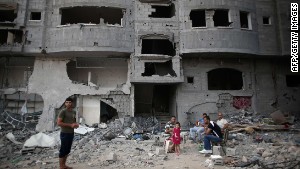 Both sides agree to 24-hour cease-fire
Both sides agree to 24-hour cease-fire
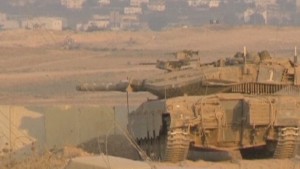 Time running out in Gaza cease-fire
Time running out in Gaza cease-fire
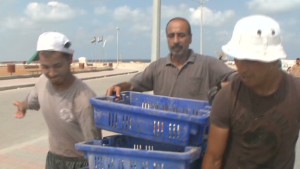 Fishermen struggle under restrictions
Fishermen struggle under restrictions
Israeli Prime Minister
Benjamin Netanyahu ordered the Israel Defense Forces to respond to the
rockets, a senior Israeli official told CNN. An IDF statement shortly
afterward said strikes were being carried out against targets in Gaza.
"Yet again, terrorists
breach the ceasefire and renew fire at Israeli civilians from Hamas
ruled Gaza Strip," Israel Defense Forces spokesman Peter Lerner said in
the statement.
"This continued
aggression will be addressed accordingly by the IDF; we will continue
striking terror infrastructure, pursuing terrorists, and eliminating
terror capabilities in the Gaza Strip, in order to restore security for
the State of Israel."
It's not yet clear who fired the rockets from Gaza, and no group has claimed responsibility.
However, Hamas spokesman Sami Abu Zouhri, in a text message sent to CNN, denied that Hamas was responsible.
"We have no information
about rockets being shot from Gaza to Israel. The aim of the air strikes
on Gaza is to stop the negotiations in Cairo. The Israeli occupation
bears the responsibility for this," he said.
Nine Palestinians,
including three children, were wounded in an Israeli airstrike in Rafah,
Ashraf el-Qedra, spokesman for the Palestinian Health Ministry in Gaza,
told CNN.
Al Aqsa TV reported airstrikes in northern and central Gaza, as well.
In Israel, warning
sirens once again sounded in the Sdot Negev area, as Israel's missile
defense system was seen intercepting rockets.
Hamas: Struggle will continue
Izzat Risheq, a Hamas
leader who is part of the Palestinian negotiating delegation in Cairo,
said via Twitter: "The struggle of our people will not depend on whether
we have a truce or not.
"Our struggle, however, will continue on until our peoples' goals of freedom and national independence are achieved."
A thick plume of smoke could be seen rising from a building in southern Gaza apparently hit by an Israeli airstrike.
A CNN team on the ground
also saw earlier what appeared to be three rockets being fired from
Gaza into Israel, leaving smoke trails in the sky.
Shortly before the
rockets were launched, Hamas spokesman Fawzi Barhoum said in an e-mailed
statement to CNN: "If Netanyahu does not understand our message and
people's demands in Gaza through political language, we know a way to
make him understand."
A banner on the Hamas-run Al-Aqsa TV blamed Israel for violating the truce.
Cycle of violence
As the deadline for the
end of the truce was pushed back Tuesday morning, officials on both
sides offered little reason for optimism.
"There hasn't been any
progress at all," Azzam al-Ahmed, the lead Palestinian negotiator, told
reporters, dismissing earlier reports that a deal was set to be signed.
"We hope that every
minute in the next 24 hours will be used so we can reach an agreement,
or the cycle of violence will continue," he said.
Negotiating through
Egyptian go-betweens, Israel and the Palestinians had been attempting
over the past week to resolve longstanding issues amid a temporary
ceasefire in the deadly fighting in and around Gaza.
Under the latest extension, the truce was set to expire at midnight Tuesday ( 5 p.m. ET).
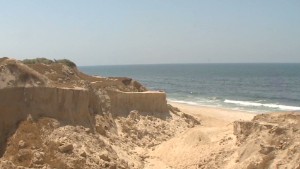 Rebuilding Gaza for the future
Rebuilding Gaza for the future
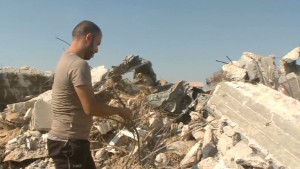 Gaza residents returning home
Gaza residents returning home
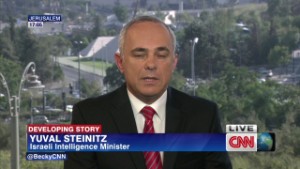 Steinitz: Gaza demilitarization main objective
Steinitz: Gaza demilitarization main objective
'Very fragile and very explosive'
On Monday, Mustafa
Barghouti, leader of the Palestinian National Initiative, accused the
Israelis of blocking the path to an agreement. He said by phone from
Gaza, after returning from Cairo, that the situation is "very fragile
and very explosive."
Meanwhile, Netanyahu
said that Israel was "prepared for any scenario," with the Israeli
military ready "for a very firm action if fire is resumed."
Israeli forces have
remained positioned around Gaza since they withdrew two weeks ago after
destroying more than 30 tunnels, some of which extended under the border
into Israel.
The conflict, which began in early July, has killed more than 2,000 Palestinians, leaving entire Gaza neighborhoods in rubble.
The violence has killed 67 people on the Israeli side, with militants in Gaza firing roughly 3,500 rockets toward Israel.
'Impossible demands'
In the talks, Israel was
calling for Gaza to be demilitarized, demanding that Hamas, which
controls the territory, and other militant groups lay down their arms.
Risheq, the Hamas leader, said Monday that the group's weapons were "for self-defense" against Israel.
"But when we have our
own Palestinian state with its own national army to protect its
citizens, there will be no need for any party to carry any kind of
weapons," he said.
Speaking on condition of
anonymity Monday, a Hamas leader said the Israelis had "submitted
impossible demands on the Palestinians such as the issue of
demilitarization, destroying the tunnels and the issue of preventing
Palestinians from developing their missiles technology."
The Israelis, he said, "want everything and want to give nothing."
He said the Palestinians
had responded with a counterproposal offering Israel "full security in
exchange of full opening of border crossings" or lifting the siege
completely.
Dispute over blockade
But a senior Israeli official suggested to CNN that there were contradictions coming from the Palestinian side.
"How can Israel have
full security while they're still digging terror tunnels and making
rockets?" he asked, saying the Palestinians "can't cherry pick what they
want."
Palestinians say
Israel's blockade is throttling the economy of the small, impoverished
strip of land and the lives of its inhabitants.
Among their demands are the rebuilding and reopening of Gaza's airport and the establishment of a seaport.
But Israeli authorities
-- who retain control of Gaza's airspace, Mediterranean waters and their
shared border -- say that releasing their grip on what goes into and
out of the territory isn't feasible while Hamas and other groups are
still building up their arsenals of weapons.
CNN's Frederik Pleitgen reported from Gaza,
Jethro Mullen reported and wrote from Hong Kong, and Laura Smith-Spark
wrote in London. CNN's Reza Sayah, John Vause, Steve Almasy, Ali Younes,
Amir Tal, Kareem Khadder and Andrew Carey contributed to this report.
We recommend
From around the web
New water-retaining gel raises hope for wide use
(Promoted - Nikkei Asian Review)
10 Things You Didn’t Know About The Zulu Language
(Promoted - AFK Travel)
Marshals to Seize Kurdish Oil, Leaving Questions on U.S. Policy
(Promoted - Roll Call)
Do We Need a Data Center Masters Degree?
(Promoted - Strategic Data Center)
Part of complete coverage on
Tensions in the Middle East
Here's a look at some of the most serious
conflicts involving Israel and its neighbors -- conflicts that have
spanned more than six decades.
August 19, 2014 -- Updated 0904 GMT (1704 HKT)
19-year-old Udi Segal explains why he won't join his country's military.
August 19, 2014 -- Updated 1234 GMT (2034 HKT)
The sights at the Gaza zoo couldn't be sadder, after it was nearly destroyed during recent Israel-Hamas conflict.
August 15, 2014 -- Updated 1611 GMT (0011 HKT)
Both Hamas and Israel have chosen conflict
over real peace negotiations again and again in the past, writes Rabbi
Yehiel Grenimann.
August 15, 2014 -- Updated 1505 GMT (2305 HKT)
Mohammed Najib says Hamas' objectives also include ending its political isolation.
August 8, 2014 -- Updated 2207 GMT (0607 HKT)
With so many conflicts, on so many fronts, here's a quick look at what's happening.
July 5, 2014 -- Updated 1429 GMT (2229 HKT)
Alan Elsner: How Israel reacts will be decisive turning point for both Israelis and Palestinians.
August 8, 2014 -- Updated 2059 GMT (0459 HKT)
The Israel-Gaza conflict impacts families on both sides. Karl Penhaul speaks to the family of a militant killed in Gaza.
August 7, 2014 -- Updated 0141 GMT (0941 HKT)
A sense of Egypt's historic role and the
traditional animosity of their military toward Islamist radicalism have
propelled Egypt to take a central role in the on-off cease-fire talks.
August 6, 2014 -- Updated 2150 GMT (0550 HKT)
If the Gaza truce holds and Israel's Operation Protective Edge comes to its conclusion, some things are certain.
August 6, 2014 -- Updated 1626 GMT (0026 HKT)
CNN's Tim Lister says, to secure peace, Israel needs to offer Gazans a better future.
August 5, 2014 -- Updated 2035 GMT (0435 HKT)
Tensions between U.S. President Barack Obama and Israeli Prime Minister Benjamin Netanyahu have been strained for years.
August 6, 2014 -- Updated 1316 GMT (2116 HKT)
Images from the conflict between Israel and Hamas depict apparent civilians, caught in the middle.
August 5, 2014 -- Updated 1306 GMT (2106 HKT)
Hamas must be tamed through politics, not the failed strategy of war, argues Ed Husain.
August 4, 2014 -- Updated 1355 GMT (2155 HKT)
It may have started as a TV debate about the Israel-Hamas conflict, but it's now turned into an online war of words.
August 4, 2014 -- Updated 1820 GMT (0220 HKT)
Hamas' political leader, who lives in Qatar, sits down with CNN for an exclusive interview.
August 4, 2014 -- Updated 1043 GMT (1843 HKT)
Nafoz Mohammed is living in a cramped two-room apartment with 16 other people, hours holed up in fear.
August 3, 2014 -- Updated 0454 GMT (1254 HKT)
Karl Penhaul visits a destroyed section of Gaza and learns how the bombing has affected one student's aspirations.
August 1, 2014 -- Updated 0615 GMT (1415 HKT)
The birth of a child is normally a joyous occasion, but it is tinged by sadness and anxiety in Gaza. Ian Lee reports.
July 31, 2014 -- Updated 1724 GMT (0124 HKT)
Amid the Gaza conflict, experts try to figure out who's in charge of "the resistance."
July 30, 2014 -- Updated 1010 GMT (1810 HKT)
The opening was so small that CNN's Wolf Blitzer -- no physical giant -- had to bend down to climb inside.
Follow CNNArabic for the latest news and analysis from the Middle East and rest of the world.
Most Popular
Today's five most popular stories
Home | Video | World | U.S. | Africa | Asia | Europe | Latin America | Middle East | Business | World Sport | Entertainment | Tech | Travel | iReport
Tools & Widgets | RSS | Podcasts | Blogs | CNN Mobile | My Profile | E-mail Alerts | CNN Shop | Site map | CNN Partner Hotels
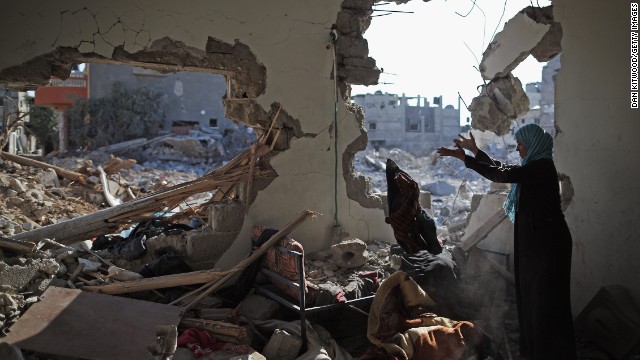 Islam El Masri begins to sort
through the rubble of her destroyed home in Beit Hanoun, Gaza, on
Thursday, August 14, as a new cease-fire between Israel and Hamas went
into effect. Israel launched a ground operation in Gaza on July 17 after
a 10-day campaign of airstrikes failed to halt relentless Hamas rocket
fire on Israeli cities.
Islam El Masri begins to sort
through the rubble of her destroyed home in Beit Hanoun, Gaza, on
Thursday, August 14, as a new cease-fire between Israel and Hamas went
into effect. Israel launched a ground operation in Gaza on July 17 after
a 10-day campaign of airstrikes failed to halt relentless Hamas rocket
fire on Israeli cities.






































0 comments:
Post a Comment